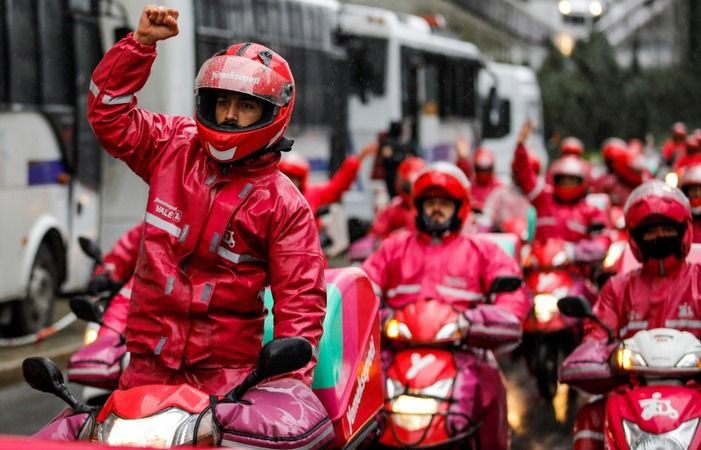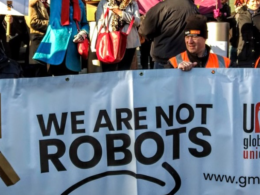By Dan O’Rourke
Echoing ‘Striketober’ in the US, and perhaps foreshadowing a global trend, the rising cost of living has set off a wave of protests and strikes in Turkey. Workers in a diverse set of industries, from steel to journalism, have been demanding, and winning, better pay and working conditions – while also facing down police violence and repression.
High energy prices have seen people burn electricity bills and refuse to pay them in ongoing protests. Inflation in Turkey is reported to be at between 36% and 115%. Workers are also suffering under President Erdoğan’s murderous ‘herd immunity’ approach to the Covid pandemic.
Widespread protests against energy costs
Protests have spread across the country over electricity price hikes as millions struggle to pay bills. Opposition politicians have vowed not to pay their bill until the Government takes action. Turkish workers are already struggling to make ends meet due to a currency crash in December. Women have been hit particularly hard, echoing trends seen around the world.
Healthcare workers
On Tuesday, 8 February health care workers in several Turkish cities conducted a one-day strike, demanding better pay and working conditions after propping up society during the pandemic. This was followed by a two-day strike on 17 February called by local doctors’ union Hekim-Sen.
Reflecting the mood of healthcare workers internationally, Şebnem Korur-Fincancı, the head of the Turkish Medical Association said, “We live in conditions where our labour is devalued and we are alienated from our labour… Physicians are exhausted, health workers are exhausted… We want free healthcare that is accessible to everyone.”
She also criticised the increasing harassment and violence faced by healthcare workers, stating “wrong health policies and violence, which have been aggravated further with the onset of the pandemic, are hurting and claiming the lives of healthcare workers in Turkey every day.”
Journalists
At BBC Istanbul, journalists carried out the country’s first media strike in 13 years and secured the wage hike they demanded, among other new benefits. Workers at beIN Media, a Qatar-based media conglomerate, also demanded an increase above the initial 17% they had been offered.
Transport Workers
A successful wildcat strike by delivery drivers at e-commerce company Trendyol has inspired transport workers at other companies to follow suit. Following a three-day strike, workers at Trendyol secured a 38.8% rise in wages after refusing the initial 11% offer.
Workers at food delivery company Yemeksepeti have been protesting since 1 Feb. They are demanding a similar wage increase and the right to unionise. Transport and delivery workers at Surat Kargo, Aras Kargo, Scotty, Yurtici Kargo and HepsiJet have also protested and put forward demands.
During Turkey’s particularly harsh lockdowns, delivery workers have been hailed as heroes and are receiving significant public support during the strikes. A boycott of Yemeksepeti has seen sales plummet.
On 14 February, members of the Warehouse, Port, Dock and Maritime Workers Union (DGD-SEN), protested after 257 of them were dismissed by bosses at Migros, one of the biggest supermarket chains in Turkey, for demanding a meagre increase in wages. They said, “What is allotted to us is a system of slavery. The dismissal of 257 workers in the dead of winter…”
Industrial workers
Inspired by the protests against steep electricity bills, workers at Turkish Ship Breaking yards called a strike on Tuesday, 15 February. Approximately 1,500 workers are on strike, stopping work at 22 facilities. Workers’ demands include salary increases, overtime pay on holidays, stopping the practice of docking pay when weather conditions prevent work, and protection for all the strikers. As well as the risk of death and injury while working, workers point to much higher cancer rates among ship breaking workers compared to the Turkish average.
At the Farplas Automotive plan, which supplies parts to Renault, Toyota, Hyundai, Ford and Fiat, 106 workers and two union reps have been released by police, after being taken into custody. Workers had occupied the plant after bosses sacked 150 employees for taking part in previous work stoppages relating to a pay dispute. This occurred despite the union being officially recognised. During the assault by police, surveillance drones and chemical tear gas were used and one worker reportedly had his leg broken.
In southern Turkey, 835 workers at Çimsataş metal factory have halted work in a wildcat strike against their bosses and their union after bureaucratic union leaders signed an agreement without input from the workers. Riot police attacked workers with water canons to prevent effective picketing at the plant.
Effective union leadership needed
The lack of effective union leadership, and workers being forced into wildcat strikes in order to make ends meet, is indicative of a global tendency for union leadership to take ‘social partnership’ approach to working-class struggles, in which the leadership acts almost as a neutral intermediary between the workers and bosses. Instead they must actively take the side of the workers they represent and fight for real gains.
Over the course of the pandemic, bosses proffitted massively, but, as ever, will not share the unearned spoils without a fight.










 Paul Murphy, Socialist Party MEP
Paul Murphy, Socialist Party MEP

